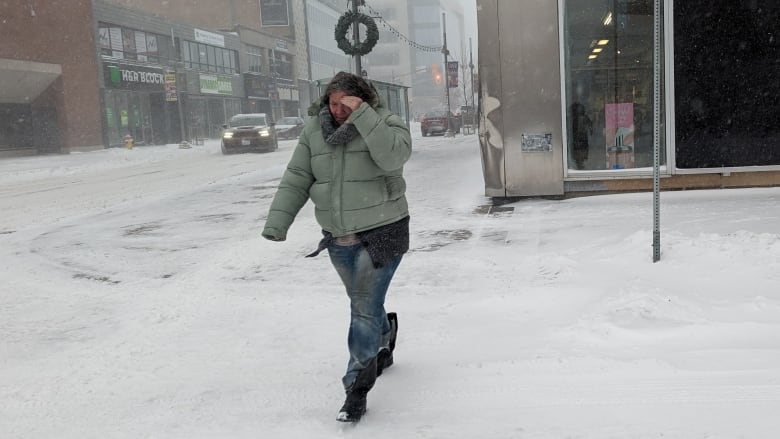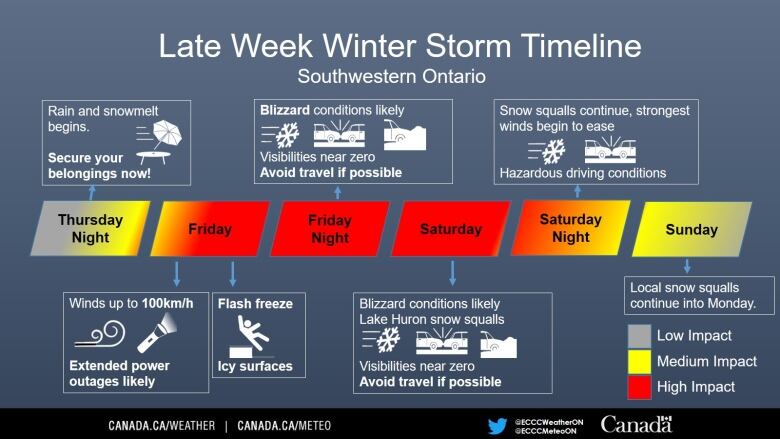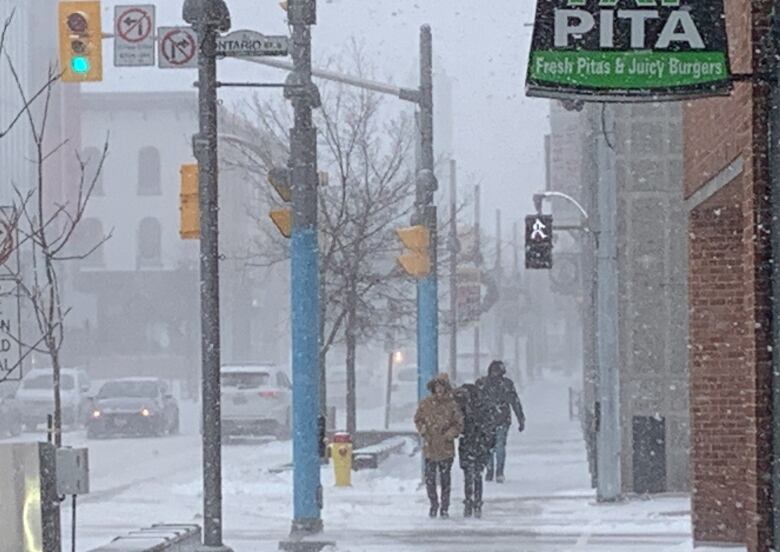Winter storm wallops Waterloo region, Guelph, snow events declared
Warming centres to open in region as temperatures expected to drop rapidly

A wintry blasthit Waterloo region, Guelph and surrounding areas Friday and is expected to continue into the weekend.
Environment Canada issued a winter weather travel advisory Saturday morning into the evening or the region,Guelph and southern Wellington county. Extreme cold wind chills may hit near30 with strong wind gusts of 80 kilometres per hour.
The weather agency is warning drivers of hazardous travel conditions and reduced visibility on the roadways due toto flurries and blowing snow.
However, extreme cold wind chill conditions are expected to improve "slightly" this afternoon," Environment Canada says.
On Friday, police across southern Ontario reported multiple crashes and road closures.
Schools in Waterloo region were closed and there werenumber ofother closures including local universities, libraries, museums, municipal offices andcommunity centres.
Snow events were declared Friday afternoon in Cambridge, Kitchener and Waterloo. When a snow event is declared, parking is prohibited on all streets at any time.The snow event remains in effect until 9 p.m. on Saturday.
WoolwichTownship and Wilmot Township havedeclaredsignificant weather events. The townships saythis is to warn people that"caution is to be observed when travelling on township roads and that it may take longer than usualto bring the condition of the roads back to a state of repair."
The Township of Wellesley upgraded its snow event to a significant weather event on Saturday, noting that all roads in the township are closed.
People are being advised not to park on streets or roadways so snowplows can clear snow effectively.
People can sign up for Alert Waterloo Region to receive notifications on their phone or via email about severe weather in the community.
If the power or data on your device is low, get your storm updates onCBC Lite. It's our low-bandwidth, text-only website.
If you need to keep warm
Environment Canadawarning preparedness meteorologist Peter Kimbell says it's going to get cold over the next few days in Waterloo region. On top of that, it's going to be very windy, with up to 100 km/h winds in some areas at times.
"The wind will almost certainly be causing power outages in many, many areas and that means that power will be out as temperatures are dropping below well below 0 C," he said. "That obviously is the big concern for many people if they don't have power when it's so cold."

The Region of Waterloo says it will be moving to its extreme cold weather procedures, which includes opening warming centres on Friday. The region is also working to provide additional emergency shelter spaces for people experiencing homelessness.
Kitchener bylaw says its officers havegone to the encampment on Roos Island in Victoria Park to encourage people still living in tents to use the emergency shelter spaces during the storm.
Normally, warming centres can include local libraries, municipal buildings and community centres. The region advises that some locations, like libraries, may have shortened hours due to the holidays.
Regional buildings at150 Main St. in Cambridge, 150 Frederick St. in Kitchener and 99 Regina St. in Waterloo will remain open.
- See the list of warming centres in Waterloo region
- See the list of emergency shelters, services and outreach in Waterloo region
If you lose your heat or electricity
Alectra Utilities, which serves Guelph and other communities in southern Ontario, says when rain and freezing temperatures mix, it can lead to ice on tree branches or power lines. Add wind and that means tree branches can break on top of those lines, or power lines can fall.
If someone finds a downed power line, it's important to stay at least 10 meters away and call 911, the utility said.
All local hydro companies have outage maps on their websites so people can see if it's an issue that involves just their own home or the entire neighbourhood. In the case of an outage, people can contact the customer service phone number on the local hydro company's website.
Alectra Utilities advised people should ensure their phones are charged and recommended people have an emergency kit.
The Alert Waterloo Region website says people should have supplies to keep safe and healthy for 72 hours.
The Government of Canada says a basic emergency kit should include:
- Water at least two litres of water per person per day.
- Food that won't spoil like canned items, energy bars and dried foods.
- A manual can opener.
- A wind-up or battery-powered flashlight and extra batteries.
- A wind-up or battery-powered radio.
- A first aid kit.
- Extra vehicle and house keys.
- Cash.
- Family documents such as identification, insurance and bank records.
Enbridge Gas and the Technical Standards and Safety Authority (TSSA) also recommend people check their gas meters and external exhaust outlets for furnaces, fireplaces, water heaters and all fuel-burning devices to ensure there is no snow or ice build up. Thatnot only ensures the equipment continues to function safely, but it allows for easy access in the case of an emergency.
Some exhaust vents that extend outside of a home can be as low as one foot above ground and have the potential to get covered and blocked.
"We have seen CO poisoning incidents from snow-blocked vents in the past, and these incidents can be fatal, so it's essential that homeowners are vigilant about keeping their exhaust vents clear," Sam Sadeghi, director of fuels safety for TSSA, said in a newsrelease.
If you're outside
The region notes extreme cold can come with health risks and it can be particularly serious for:
- Adults over the age of 65.
- Infants and young children.
- People who work outdoors.
- People who are getting exercise or taking part in outdoor activities.
- People with chronic illnesses.
- People experiencing homelessness and who lack shelter, warm clothing and food.
- Frostbite happens when the skin freezes and can often affect a person's hands, feet, nose and ears.
"Mild frostbite, frostnip, makes your skin look yellowish or white but is still soft to the touch. Normal colour returns once the area is warmed," the Region of Waterloosays on its extreme cold website. "Severe frostbite can permanently damage tissue if it is not treated immediately."
Hypothermia is a medical emergency and 911 should be called if a person exposed to cold temperatures has a low body temperature of less than 35 C, is unconscious, shivering, confused, drowsy or unsteady.
If a person is found in that state, the region says they should:
- Be moved to a warm place.
- Remove any wet clothing.
- Be wrapped in warm blankets, towels, wrapped hot water bottles or heating pads, or skin-to-skin contact.
- Be provided warm drinks if they are awake.

If you are shovelling snow
Dr. Peter Lin, a medical columnist with CBC Radio, says sore backs and heart attacks can be a concern when people tackle the first big snowfall of the year.
"People go from sitting watching TV to lifting snow," he said.
He said if it's 12 centimetres of fluffy snow, it feels like a person is moving about 90 kilograms of snow off their driveway or sidewalks, but if it's 12 centimetresof wet snow, that's more like 900 kilograms.
"Think of this as a huge exercise. Stretch out your muscles, go nice and slow. Do not stress your heart out, do not wreck your back in the process. So go really slow and that way you won't have to have a hospital visit," he said.
When it comes to clearing snow from sidewalks:
- The City of Cambridge says people need to clear their sidewalks within 36 hours of a snowfall ending and they ask residents not to put the snow back on the roadway.
- In Kitchener, property owners must clear sidewalks within 24 hours of snowfall and it "must be maintained to bare pavement." The city clears specific sidewalks, trails, paths and bike lanes.
- In Waterloo, the city clears sidewalks not connected to a residence or business, while property owners have 24 hours after the end of snowfall to clear sidewalks connected to a home or business.
People who shovel are also asked to help keep catch basics clear of snow and to move snow away from fire hydrants on their property.
Enbridge Gas reminds people not to shovel, plow or blow snow against their gas meter or vent pipe to ensure those items continue to work properly through adverse weather.
If you're walking
Dr. Peter Lin noted falling iscommon when there's snow and ice and this often results in fractured wrists, arms or legs.
"Pay attention to where you're walking," he said.
The Canada Safety Council suggests people should wear a good pair of winter boots for both warmth and stability if walking outside in winter. Ice grippers can also help people walk over hard-packed snow or ice.
Ski poles, a cane or walker can help provide stability. People going out should also wear brightly coloured clothing or reflective materials to be seen by drivers and others and a warm hat, scarf, mittens or gloves will prevent heat loss.
People could also carry a small bag of grip - such as sand or non-clumping cat litter in their jacket pocket or purse to sprinkle on icy sidewalks or ask someone for help to get across a particularly slippery spot.
If people can't avoid an icy patch, the safety council says they should slow down and spread feet further apart to provide a base of support.
If you're driving
First of all,reconsider that idea.
"Avoid driving if at all possible," Kimbell said.
The winter storm warning recommends people consider postponing non-essential travel as roads could be slippery due to flash freezing conditions and visibility could be close to zero at times with heavy and blowing snow.
"If visibility is reduced while driving, slow down, watch for tail lights ahead and be prepared to stop."
OPP reported multiple collisions Friday afternoon. Parts of Hwy. 401 between London and Windsor were closed due to multiple accidents, including a 50-plus vehicle pileup near Sarnia.
Perth County OPP said all roads in the county were closed due to deteriorating conditions.
Wellington County OPP warned drivers were going too fast.
"Multiple accidents already this morning due to drivers not adjusting their driving behaviour," they tweeted.
Road conditions are worsening in @wellingtncounty. #WellingtonOPP are asking motorists to avoid unnecessary travel. Drivers are going TOO FAST in these poor weather conditions. Multiple accidents already this morning due to drivers not adjusting their driving behaviour. ^JU pic.twitter.com/eljiSss3wM
—@OPP_WRIn Cambridge, the city notes roads are cleared in the following order:
- Primary roads, which are higher volume arterial roads to allow emergency vehicles the ability to respond quickly.
- Secondary roads, which are the roads used by transit and that help the city "continue to operate."
- Residential roads, which are done only after a significant snowfall of eight centimetres or more.
Kitchener and Waterloo follow similar road clearing protocols.
In Kitchener:
- Major arterial roads are done first, which includes plowing and/or de-icing.
- Major collector roads and those with Grand River Transit routes come next.
- Residential streets are done onlyafter the other two are completed.
In Waterloo:
- Major arterials roads are cleared six hours after at least 5 cm of snow has accumulation..
- Major collector and Grand River Transit routes are cleared 12 hours after 8 cm of accumulation.
- Residential streets are cleared 16 hours after8 cm of accumulation.
- Minor residential and cul-de-sacs are cleared 24 hours after 10 cm of accumulation.
The Ontario government recommends people keep a winter survival kit in their vehicles.
The kits should include:
- Charged phone.
- Water.
- Non-perishable food.
- Flashlight.
- Blanket and warm clothes.
- Jumper cables.
- Shovel.
- Traction mats or sand.
- Candles and a lighter or matches.
If you need to park somewhere
All the cities recommend people avoid parking on streets while snow plows are on the roads. During a declared snow event, on-street parking is not permitted at any time in Kitchener, Waterloo or Cambridge.
If you're travelling elsewhere
The Region of Waterloo International Airport has flights scheduled to arrive and depart on Friday, but administration warns people will want to check the status of their flight with the airlinebefore arriving at the airport.
The Greater Toronto Airport Authority warns on its website that delays and cancellations are expected at Toronto's Pearson Airport and people should check their flight status with the airline.












_(720p).jpg)


 OFFICIAL HD MUSIC VIDEO.jpg)
.jpg)



























































































